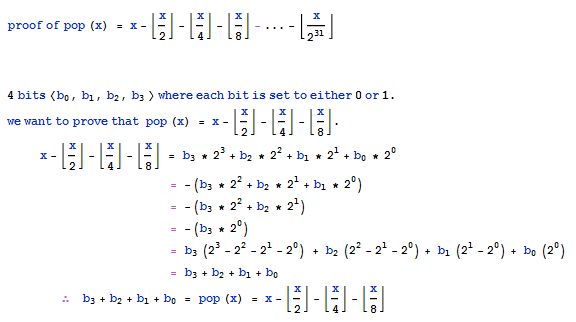Counting bits
Determining the number of bits set to 1 in a particular value is an interesting problem, commonly referred to as a population count, and often referred to in assembly language simply as pop. My favorite approach to this problem, and the way it is often implemented in cpu hardware is a recursive approach, and is almost like the reverse of a binary search in the way it accomplishes counting the bits set to 1 in a register value.
Suppose that our registers are n-bit registers. Divide the problem into two halves, and we now need to count the number of one bits in two n/2 bit values. We continue onto four n/4 bit values, eight n/8 bit values, etc. until the number of bits in each value we are counting is two, a trivially easy problem.
1 2 3 4 5 6 7 8 9 10 11 12 13 | |
The value we started with is 0xbc637eff. It is used for this example because it has a rather average population count.
The code for this algorithm is much like the code for reversing bits in a register, and uses the same divide and conquer approach that we see in binary search.
1 2 3 4 5 6 7 8 9 10 11 12 | |
This algorithm is based on the following formula:
![]()
Let’s prove our equation in the case of a 4-bit register:

You can try extending this proof to the case of a 32-bit register, and you will get the same results.